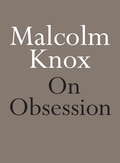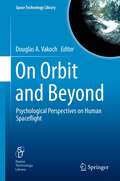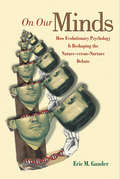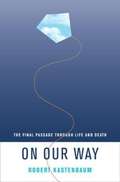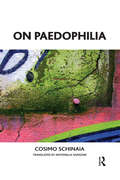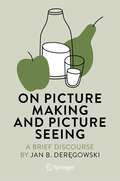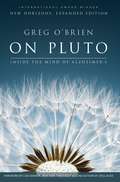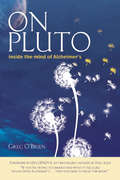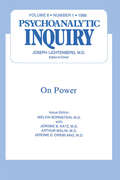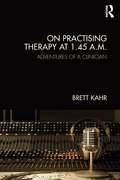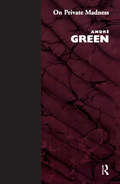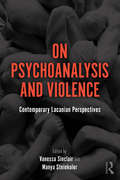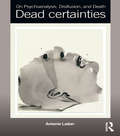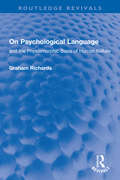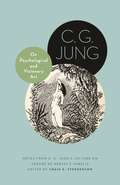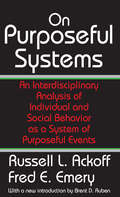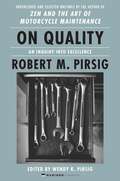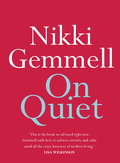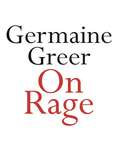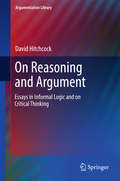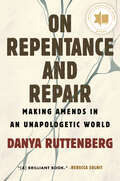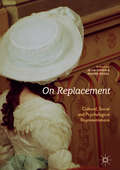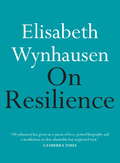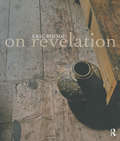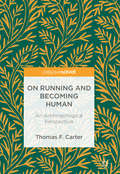- Table View
- List View
On Obsession
by Malcolm Knox'When we are young adults, not only are we looking for signposts but we are afraid of ourselves, frightened of where our tendencies may lead. Are we all just a tiny bit mad, and were my obsessions, like my grandfather's, always going to take on a mild and manageable aspect?'In On Obsession, Malcolm Knox contemplates love, Proust, soulmates in fiction, palindromic numbers and bloodlines, among other fixations, and wonders if the obsessive quest marks a retreat from life.
On Orbit and Beyond
by Douglas A. VakochAs we stand poised on the verge of a new era of spaceflight, we must rethink every element, including the human dimension. This book explores some of the contributions of psychology to yesterday's great space race, today's orbiter and International Space Station missions, and tomorrow's journeys beyond Earth's orbit. Early missions into space were typically brief, and crews were small, often drawn from a single nation. As international cooperation in space exploration has increased over the decades, the challenges of communicating across cultural boundaries and dealing with interpersonal conflicts have become all the more important, requiring different coping skills and sensibilities than "the right stuff" expected of early astronauts. As astronauts travel to asteroids or establish a permanent colony on the Moon, with the eventual goal of reaching Mars, the duration of expeditions will increase markedly, as will the psychosocial stresses. Away from their home planet for extended times, future spacefarers will need to be increasingly self-sufficient, while simultaneously dealing with the complexities of heterogeneous, multicultural crews. "On Orbit and Beyond: Psychological Perspectives on Human Spaceflight," the second, considerably expanded edition of "Psychology of Space Exploration: Contemporary Research in Historical Perspective," provides an analysis of these and other challenges facing future space explorers while at the same time presenting new empirical research on topics ranging from simulation studies of commercial spaceflights to the psychological benefits of viewing Earth from space. This second edition includes an all new section exploring the challenges astronauts will encounter as they travel to asteroids, Mars, Saturn, and the stars, requiring an unprecedented level of autonomy. Updated essays discuss the increasingly important role of China in human spaceflight. In addition to examining contemporary psychological research, several of the essays also explicitly address the history of the psychology of space exploration. Leading contributors to the field place the latest theories and empirical findings in historical context by exploring changes in space missions over the past half century, as well as reviewing developments in the psychological sciences during the same period. The essays are innovative in their approaches and conclusions, providing novel insights for behavioral researchers and historians alike.
On Our Minds: How Evolutionary Psychology Is Reshaping the Nature versus Nurture Debate
by Eric M. GanderThere is no question more fundamental to human existence than that posed by the nature-versus-nurture debate. For much of the past century, it was widely believed that there was no essential human nature and that people could be educated or socialized to thrive in almost any imaginable culture. Today, that orthodoxy is being directly and forcefully challenged by a new science of the mind: evolutionary psychology. Like the theory of evolution itself, the implications of evolutionary psychology are provocative and unsettling. Rather than viewing the human mind as a mysterious black box or a blank slate, evolutionary psychologists see it as a physical organ that has evolved to process certain types of information in certain ways that enables us to thrive only in certain types of cultures.In On Our Minds, Eric M. Gander examines all sides of the public debate between evolutionary psychologists and their critics. Paying particularly close attention to the popular science writings of Steven Pinker, Edward O. Wilson, Richard Dawkins, and Stephen Jay Gould, Gander traces the history of the controversy, succinctly summarizes the claims and theories of the evolutionary psychologists, dissects the various arguments deployed by each side, and considers in detail the far-reaching ramifications—social, cultural, and political—of this debate. Gander's lucid and highly readable account concludes that evolutionary psychology now holds the potential to answer our oldest and most profound moral and philosophical questions, fundamentally changing our self–perception as a species.
On Our Way: The Final Passage Through Life and Death
by Robert Kastenbaum"How do our ideas about dying influence the way we live? Life has been envisioned as a journey, the river of time carrying us inexorably toward the unknown country - and in our day we increasingly turn to myth and magic, ritual and virtual reality, cloning and cryostasis in the hope of eluding the reality of the inevitable end. In this book a preeminent writer on death and dying proposes a new way of understanding our last transition. A fresh exploration of the final passage through life and perhaps through death, his work interweaves historical and contemporary experiences and reflections to demonstrate that we are always on our way. Drawing on a range of observations -- from psychology, anthropology, religion, biology, and personal experience -- Robert Kastenbaum re-envisions life's forward-looking progress, from early-childhood bedtime rituals to the many small rehearsals we stage for our final separation."--BOOK JACKET. Title Summary field provided by Blackwell North America, Inc. All Rights Reserved
On Paedophilia
by Cosimo SchinaiaThis book deepens the communicative dynamics by which even through the mass media the paedophile has become the plague-spreader. It is an attempt to underline that only an integrative approach can give an appropriate answer to the clinical complexity characterising paedophilic pictures.
On Picture Making and Picture Seeing: A Brief Discourse (Vision, Illusion and Perception #4)
by Jan B. DeręgowskiArchaeological and anthropological investigations of depictions seldom extend beyond a single culture or a single geographical location, although there is a powerful factor common to all depictions, the factor of human perception. In this volume an attempt is made to show how this factor affects both creation and recognition of depictions, how, in common with everyday vision of the environment, typical contours are derived and used, not merely to depict individually readily recognisable models, but also how by concatenation they lead to such a splendid figure as Australian Kakadu crocodiles, or by distortion to creation of illusions of pictorial depth, such as is evoked by Leonardo da Vinci’s perspective and by inverted (Byzantine) perspective thought by some to be an aberration. Bartel’s studies show that pictorial depth is often achieved to the artist’s, and many a viewer’s, but not to geometer’s satisfaction by partial distortion, and Chinese masterpieces embody, side by side, ‘normal’ and inverted perspective. The visual process is universally uniform (if it were not, one would not be able to recognise an Altamira bison as a bison) and its foibles can be freely exploited. Its best known exploiter is probably Cezanne. His pictures are admired by many and puzzle many. Strzemiński postulated that they compound distinct lines of sight, thus endorsing primacy of central vision, a concept thought by Gombrich to be of greater import to geometers than to artists.
On Pluto: Inside The Mind Of Alzheimer's
by Lisa Genova Greg O'BrienThis is a book about living with Alzheimer’s, not dying with it. It is a book about hope, faith, and humor—a prescription far more powerful than the conventional medication available today to fight this disease. Alzheimer’s is the sixth leading cause of death in the US—and the only one of these diseases on the rise. More than 5 million Americans have been diagnosed with Alzheimer’s or a related dementia; about 35 million people worldwide. Greg O’Brien, an award-winning investigative reporter, has been diagnosed with early-onset Alzheimer's and is one of those faceless numbers. Acting on long-term memory and skill coupled with well-developed journalistic grit, O’Brien decided to tackle the disease and his imminent decline by writing frankly about the journey. O’Brien is a master storyteller. His story is naked, wrenching, and soul searching for a generation and their loved ones about to cross the threshold of this death in slow motion. On Pluto: Inside the Mind of Alzheimer’s is a trail-blazing roadmap for a generation—both a “how to” for fighting a disease, and a “how not” to give up!
On Pluto: Inside the Mind of Alzheimer's
by Lisa Genova Greg O'BrienThis is a book about living with Alzheimer’s, not dying with it. It is a book about hope, faith, and humor—a prescription far more powerful than the conventional medication available today to fight this disease. Alzheimer’s is the sixth leading cause of death in the US—and the only one of these diseases on the rise. More than 5 million Americans have been diagnosed with Alzheimer’s or a related dementia; about 35 million people worldwide. Greg O’Brien, an award-winning investigative reporter, has been diagnosed with early-onset Alzheimer's and is one of those faceless numbers. Acting on long-term memory and skill coupled with well-developed journalistic grit, O’Brien decided to tackle the disease and his imminent decline by writing frankly about the journey. O’Brien is a master storyteller. His story is naked, wrenching, and soul searching for a generation and their loved ones about to cross the threshold of this death in slow motion. On Pluto: Inside the Mind of Alzheimer’s is a trail-blazing roadmap for a generation—both a “how to” for fighting a disease, and a “how not” to give up!
On Power: Psychoanalytic Inquiry, 6.1
by Melvin BornsteinFirst published in 1995. Routledge is an imprint of Taylor & Francis, an informa company.
On Practising Therapy at 1.45 A.M.: Adventures of a Clinician
by Brett KahrAlthough Professor Kahr spends most of his week facilitating traditional psychoanalytical sessions with his patients, in his spare time he has had many professional adventures outside the consulting room, broadcasting as Resident Psychotherapist for the B.B.C., lecturing about the intimacies of couple psychodynamics on the stage of the Royal Opera House, and defending “Lady Macbeth” in a murder trial at the Royal Courts of Justice in conjunction with members of the Royal Shakespeare Company. In this compellingly written and unputdownable book, Kahr shares his wealth of adventures both inside the consulting room and in the wider cultural sphere, disseminating psychoanalytical ideas more broadly. The book suggests that the “traditionalist” and the “maverick” aspects of the practising clinician can exist side by side in a fruitful collaboration. These adventures will encourage those embarking upon their first steps in the helping professions to entertain more creative ways of working.
On Private Madness
by Andre GreenThe author occupies a unique position in psychoanalysis today, and his work represents a synthesis of the traditions of Lacan, Winnicott and Bion. This volume collects fourteen of his papers together with a substantial introduction. The papers range widely across clinical and theoretical issues including borderline states, the true and false self, and narcissism. On Private Madness has achieved the status of a modern psychoanalytic classic, and this new impression will be welcomed by all those admirers of the author who wish to have these seminal papers collected together.
On Psychoanalysis and Violence: Contemporary Lacanian Perspectives
by Manya Steinkoler Vanessa SinclairPsychoanalysis has not examined violence as such since it is a sociological and criminological concept; psychoanalysis is concerned with speech. On Psychoanalysis and Violence brings together noted Lacanian psychoanalysts and scholars to fill an important gap in psychoanalytic scholarship that addresses what the contributors term the "angwash" of our current time. Today violence is everywhere. We are inundated with it, exhausted by it, bombarded by images and reports of it on a daily, even hourly basis. This book examines how psychoanalysis can account for the many manifestations of violence in contemporary society. Drawing on a broadly Lacanian perspective, the authors explore violence in war, terrorism, how the media portrays violence, violent video games, questions of identity, difference and the ‘other’; violence narratives and violence and DSM, and explain how to account for how violence arises and the effect it has on us on both an individual and social level. These are just some of the daily social realities of the present day whose aggression are felt by everyone, which horrify us and which we often feel powerless to change. The contributors have therefore coined a term for this cultural malaise: "angwash", arguing that we are awash in angoisse or anxiety, in a constant panic regarding the impossible and contradictory demands of a "civilization" in crisis. On Psychoanalysis and Violence will be of great interest to Lacanian psychoanalysts and psychoanalytic psychotherapists.
On Psychoanalysis, Disillusion, and Death: Dead certainties
by Antonie LadanFor some years now, psychoanalysts have been trying to understand the implications of neuroscientific findings for psychoanalytic theory and practice. In On Psychoanalysis, Disillusion, and Death: Dead certainties Antonie Ladan looks at how findings from neuroscience and memory research can inform our understanding of some of the most important psychoanalytic concepts, such as transference and unconscious fantasy. Central to the book are the 'dead certainties' that, to a great extent, determine how we lead our lives. Antonie Ladan argues that these certainties are too self-evident to be seen, as invisible as the air we breathe. He shows how in our associations with others, we are in large measure 'guided' by 'dead certain' relational patterns of which we are not conscious, but that remain implicit. Using clinical examples, Ladan illustrates how a specific form of observation, where the analysand and the analyst pay careful attention to their relationship over an extended period of time, makes it possible to gradually recognise these automatic expectations and behaviours in relational situations. On Psychoanalysis, Disillusion, and Death explores how the psychoanalyst can bring the implicit patterns, within which analysands find themselves trapped, to their attention enabling them to look at the world from a 'disillusioning' perspective in order to accept life and the prospect of death for what they are. This book will be of interest to psychotherapists, analytical psychologists, psychoanalysts, therapists and students.
On Psychological Language: and the Physiomorphic Basis of Human Nature (Routledge Revivals)
by Graham RichardsFirst published in 1989, On Psychological Language and the Physiomorphic Basis of Human Nature was written to provide a new and controversial analysis of the nature of psychological language. The book argues that psychological concepts of all kinds are ultimately derived from concepts about the external world, so that ‘human nature’ is nothing more than ‘internalized Nature’. It draws attention to problems regarding the nature of linguistic reference, and puts forward a route for considering human psychological evolution, raising questions about the nature of psychology as a discipline and its relationship with the physical sciences. This ‘physiomorphic theory’ challenged ways of thinking about psychological language at the time of original publication. Interdisciplinary in its approach, On Psychological Language and the Physiomorphic Basis of Human Nature has enduring relevance for those with an interest in psychology, anthropology, philosophy, and linguistics.
On Psychological and Visionary Art: Notes from C. G. Jung’s Lecture on Gérard de Nerval's Aurélia (Philemon Foundation Series #12)
by C. G. JungThe first English translation of Jung&’s landmark lecture on Nerval&’s hallucinatory memoirIn 1945, at the end of the Second World War and after a long illness, C. G. Jung delivered a lecture in Zürich on the French Romantic poet Gérard de Nerval. The lecture focused on Nerval's visionary memoir, Aurélia, which the poet wrote in an ambivalent attempt to emerge from madness. Published here for the first time, Jung&’s lecture is both a cautionary psychological tale and a validation of Nerval&’s visionary experience as a genuine encounter.Nerval explored the irrational with lucidity and exquisite craft. He privileged the subjective imagination as a way of fathoming the divine to reconnect with what the Romantics called the life principle. During the years of his greatest creativity, he suffered from madness and was institutionalized eight times. Contrasting an orthodox psychoanalytic interpretation with his own synthetic approach to the unconscious, Jung explains why Nerval was unable to make use of his visionary experiences in his own life. At the same time, Jung emphasizes the validity of Nerval&’s visions, differentiating the psychology of a work of art from the psychology of the artist. The lecture suggests how Jung&’s own experiments with active imagination influenced his reading of Nerval&’s Aurélia as a parallel text to his own Red Book.With Craig Stephenson&’s authoritative introduction, Richard Sieburth&’s award-winning translation of Aurélia, and Alfred Kubin&’s haunting illustrations to the text, and featuring Jung&’s reading marginalia, preliminary notes, and revisions to a 1942 lecture, On Psychological and Visionary Art documents the stages of Jung&’s creative process as he responds to an essential Romantic text.
On Purposeful Systems: An Interdisciplinary Analysis of Individual and Social Behavior as a System of Purposeful Events (Systems Inquiry Ser.)
by Fred EmeryThis book provides an innovative foundation for looking at human and social behavior u as a system of purposeful (teleological) events. It uses a systems theoretical approach for the study of these phenomena, and illustrates and extends general systems theory.Part One develops the concepts of traditional mechanism from which, successively, the concepts of "function," "choice," "goal-seeking," and "purposefulness" are derived, leading to a quantitative formulation of "personality". Part Two provides an analysis of aspects of purposeful behavior and personality, and Part Three explores the interaction of purposeful systems. Part Four is concerned with the study of social groups and ideal-seeking behavior. Finally, structural concepts underpinning the theoretical system are redefined in technological terms, thus demonstrating the non-vicious circularity and interdependence of all scientific concepts.
On Quality: An Inquiry into Excellence: Unpublished and Selected Writings
by Robert M Pirsig Wendy K. PirsigFeaturing long-awaited selections from Robert M. Pirsig's unpublished writings, from before and after Zen and the Art of Motorcycle Maintenance, an original collection illuminating the central theme of Pirsig's thought: “Quality”“The ultimate goal in the pursuit of excellence is enlightenment." —Robert M. Pirsig, 1962More than a decade before the release of the book that would make him famous, Robert M. Pirsig had already caught hold of the central theme that would animate Zen and the Art of Motorcycle Maintenance: “Quality,” a concept loosely likened to “excellence,” “rightness,” or “fitness” that Pirsig saw as kindred to the Buddhist ideas of “dharma” or the “Tao.” As he later wrote in Zen, “Quality is the Buddha.”Though he was revered by fans who considered him a guru, the famously private Pirsig published only two books and consented to few interviews and almost no public appearances in later decades. Yet he wrote and thought almost continually, refining his “Metaphysics of Quality” until his death in 2017.Now, for the first time, readers will be granted access to five decades of Pirsig’s personal writings in this posthumous collection that illuminates the evolution of his thinking to an unprecedented degree. Skillfully edited and introduced by Wendy K. Pirsig, Robert’s wife of four decades, the collection includes previously unpublished texts, speeches, letters, interviews, and private notes, as well as key excerpts from Zen and the Art of the Motorcycle Maintenance and his second book, Lila.Since its publication in 1974, Zen and the Art of Motorcycle Maintenance has established itself as a modern classic of popular philosophy; selling millions of copies and inspiring a generation, while serving as a perennial touchstone for the generations that follow. On Quality is a remarkable contribution to our understanding of one of the most influential thinkers and writers of our time.
On Quiet
by Nikki GemmellInternationally bestselling author Nikki Gemmell writes on the power of quiet in today's shouty world. Quiet comes as a shock in these troubled times. Quietism means 'devotional contemplation and abandonment of the will ... a calm acceptance of things as they are'. Gemmell makes the case for why quiet is steadily gaining ground in this noisy age: Why we need it now more than ever. How to glean quiet, hold on to it, and work within it.
On Rage
by Germaine GreerON RAGE is Germaine Greer's timeless essay about Aboriginal dispossession. With characteristic acuity and passion, Greer looks to the causes of rage and its consequences in Indigenous Australians.Originally published six months after Prime Minister Kevin Rudd's Apology to the Stolen Generations in 2008, this is an urgent and provocative examination of disempowerment by one of Australia's leading polemicists.
On Reasoning and Argument
by David HitchcockThis book brings together in one place David Hitchcock's most significant published articles on reasoning and argument. In seven new chapters he updates his thinking in the light of subsequent scholarship. Collectively, the papers articulate a distinctive position in the philosophy of argumentation. Among other things, the author: * develops an account of "material consequence" that permits evaluation of inferences without problematic postulation of unstated premises. * updates his recursive definition of argument that accommodates chaining and embedding of arguments and allows any type of illocutionary act to be a conclusion. * advances a general theory of relevance. * provides comprehensive frameworks for evaluating inferences in reasoning by analogy, means-end reasoning, and appeals to considerations or criteria. * argues that none of the forms of arguing ad hominem is a fallacy. * describes proven methods of teaching critical thinking effectively.
On Repentance And Repair: Making Amends in an Unapologetic World
by Danya RuttenbergA crucial new lens on repentance, atonement, forgiveness, and repair from harm—from personal transgressions to our culture&’s most painful and unresolved issuesAmerican culture focuses on letting go of grudges and redemption narratives instead of the perpetrator&’s obligations or recompense for harmed parties. As survivor communities have pointed out, these emphases have too often only caused more harm. But Danya Ruttenberg knew there was a better model, rooted in the work of the medieval philosopher Maimonides. For Maimonides, upon whose work Ruttenberg elaborates, forgiveness is much less important than the repair work to which the person who caused harm is obligated. The word traditionally translated as repentance really means something more like return, and in this book, returning is a restoration, as much as is possible, to the victim, and, for the perpetrator of harm, a coming back, in humility and intentionality, to behaving as the person we might like to believe we are. Maimonides laid out five steps: naming and owning harm; starting to change/transformation; restitution and accepting consequences; apology; and making different choices. Applying this lens to both our personal relationships and some of the most significant and painful issues of our day, including systemic racism and the legacy of enslavement, sexual violence and harassment in the wake of #MeToo, and Native American land rights, On Repentance and Repair helps us envision a way forward. Rooted in traditional Jewish concepts while doggedly accessible and available to people from any, or no, religious background, On Repentance and Repair is a book for anyone who cares about creating a country and culture that is more whole than the one in which we live, and for anyone who has been hurt or who is struggling to take responsibility for their mistakes.
On Replacement: Cultural, Social and Psychological Representations
by Jean Owen Naomi SegalThis book is an interdisciplinary study of the human drama of replacement. Is one’s irreplaceability dependent on surrounding oneself by a replication of others? Is love intrinsically repetitious or built on a fantasy of uniqueness? The sense that a person’s value is blotted out if someone takes their place can be seen in the serial monogamy of our age and in the lives of ‘replacement children’ – children born into a family that has recently lost a child, whom they may even be named after. The book investigates various forms of replacement, including AI and doubling, incest and bedtricks, imposters and revenants, human rights and ‘surrogacy’, and intertextuality and adaptation. The authors highlight the emotions of betrayal, jealousy and desire both within and across generations. On Replacement consists of 24 essays divided into seven sections: What is replacement?, Law & society, Wayward women, Lost children, Replacement films, The Holocaust and Psychoanalysis. The book will appeal to anyone engaged in reading cultural and social representations of replacement.
On Resilience
by Elisabeth WynhausenElizabeth Wynhausen tells the story of an extraordinary inspirational character and reflects on the mysterious quality that is resilience. A humorous, irreverent essay that arrives at contentment and joy.
On Revelation
by Eric RhodeRevelation occurs to each of us at every hour in the form of thoughts, feelings, dreams, insights and intuitions that seemingly derive from an unknown source. It feels like a gift. And yet it is inseparable from the catastrophic. The author shows how this might be so. Writing from within a psychoanalytic tradition, he draws on material from anthropology, mythology and from theories of place and pilgrimage. He looks to Kafka's parable of the dying emperor to discover how revelation as gift and revelation as catastrophe co-exist in tragic disjunction.
On Running and Becoming Human: An Anthropological Perspective
by Thomas F. CarterHow does the simple act of running make us human? As a form of enskilled movement that shapes how we perceive our surroundings, running enacts a mindful bodily engagement with the world, an engagement that generates our very minds through perceptual learning. Thomas F. Carter examines the interrelated aspects of a runner’s being—mind, body, and environs—to illustrate that the skillful act of locomotion is one of principle ways that we as human beings become integral parts of the larger world. Synthesizing recent developments in neuroscience, anthropology, and philosophy of mind, On Running proves there is more to running than merely clocking up the miles.
